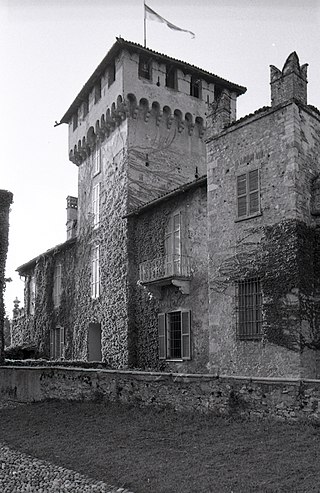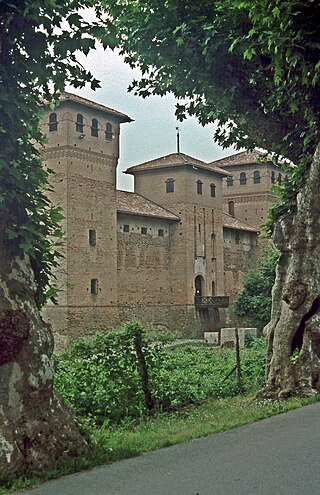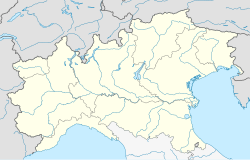
Arona is a town and comune on Lake Maggiore, in the province of Novara. Its main economic activity is tourism, especially from Milan, France and Germany.

The Rocca Borromeo di Angera, or Rocca d'Angera, also called Borromeo Castle, is a rocca on a hilltop above the town of Angera in the Province of Varese on the southern shores of Lago Maggiore. It has medieval origins and initially belonged to the Milanese archbishop. It passed then to the Visconti of Milan and later to the Borromeos, who are still the owners.

The Visconti Castle of Somma Lombardo is a medieval castle-palace in Somma Lombardo, Province of Varese, Lombardy, northern Italy.

The Visconti Castle of Bereguardo, Castello Visconteo of Bereguardo in Italian, is a medieval castle in Via Castello 2, Bereguardo, Province of Pavia, Lombardy, Italy.

The Visconti Castle, or Castello Visconteo, is a castle in the town of Cusago near Milan, Lombardy, Northern Italy. It was built in the 14th century by Bernabò Visconti and used as a hunting lodge by him and other Visconti family members. The castle underwent significant changes in the Renaissance period; today, it is in neglected conditions.

The Visconti-Sforza Castle of Novara is a castle located in the south-western border of the old center of Novara. It was erected on the former corner of the Roman and Middle Age walls that surrounded the city.

The Visconti Castle of Abbiategrasso is a medieval castle in Abbiategrasso, Lombardy, northern Italy. It was among the first Visconti castles built according to their typical quadrangular layout. In the 14th and 15th centuries, it was one of the preferred residences of the duchesses of Milan of the Visconti and Sforza houses. Today, the castle's surviving part serves as the seat of the municipality of Abbiategrasso.

The Visconti Castle of Binasco is a medieval castle in Binasco, Metropolitan City of Milan, Lombardy, Northern Italy. It is famous for having been the prison and execution place of Beatrice di Tenda, who was arrested and sentenced to death for adultery in 1418. Today, it is the seat of the Municipality of Binasco.

The Visconti Castle of Invorio was a mediaeval castle located in Invorio, Province of Novara, Piedmont, northern Italy. Only a tower today survives, surrounded by the traces of the ancient walls. Matteo I Visconti, Lord of Milan, was born there in 1250.

The Visconti Castle of Massino is a medieval castle located on the Vergante hills in the municipality of Massino Visconti, Province of Novara, Piedmont, northern Italy. Since the 12th century it has been a possession and one of the preferred residences of the Visconti of Milan. At that time it was frequented by the family ancestor of the lords and dukes of Milan. Afterwards its property was transferred to other collateral branches of the lineage, from the initial Visconti di Massino to the current Visconti di San Vito.

The Visconti Castle of Crenna is a castle of mediaeval origin located in Crenna, frazione of Gallarate, Lombardy, Northern Italy. It is linked to the fame of Lodrisio Visconti, who raised against and then reconciled with the members of the family of his cousin Matteo Visconti, Lord of Milan. In the 14th century, the castle underwent expansion and destruction according to the alternative fortunes of Lodrisio.

The Visconti-Castelbarco Castle is a castle of mediaeval origin located in Cislago, Lombardy, Northern Italy. Since the 13th century it belonged to a cadet branch of the Visconti House. In the 18th century it became a property of the Castelbarco family.

The Visconti Castle of Fagnano is a castle located in Fagnano Olona, Lombardy, northern Italy. It lies at the border between the town of Fagnano and the Olona valley.

The Visconti Castle of Legnano is a mediaeval castle, located south of the city of Legnano, Metropolitan City of Milan, Lombardy, northern Italy. It lies on a small island formed by the Olona river. Since the 13th century, it is also known as the castle of San Giorgio.

The Visconti Castle of Jerago is a castle of Middle Age origin located in Jerago, Lombardy, Northern Italy. Having been a property of members of the Visconti house between the 13th and 18th centuries, it retains still today their memory in its name.

The Visconti Castle of Cherasco is a medieval castle in Cherasco, Piedmont, Northern Italy. It was built in the 14th century by Luchino Visconti, Lord of Milan, and partly reconstructed at the beginning of the 20th century.

The Visconti Castle of Vogogna is a medieval stone-made castle in Vogogna, Piedmont, Northern Italy. It was built in the 14th century by the Visconti, lords and dukes of Milan.

The Visconti-Sforza Castle or Sforza Castle of Galliate is a medieval castle in Galliate, Piedmont, Northern Italy. It was erected in the 15th century by the Sforza, dukes of Milan, on a previous fortification built by their progenitors Visconti.

The Visconti Rocca of Romano is a rocca in Romano di Lombardia, Bergamo, Lombardy in Northern Italy. It was built in the 13th century and expanded in the 14th and 15th centuries by the Visconti and Colleoni families.






















